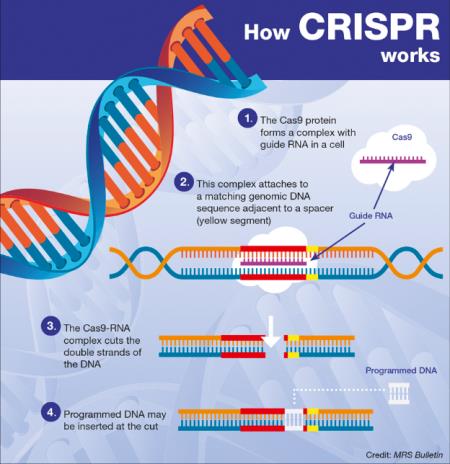 By using CRISPR to eliminating genes that encode for the proteins serving as receptor sites for pathogens, scientists are now creating family lines refractory to specific diseases or with enhanced productivity.
By using CRISPR to eliminating genes that encode for the proteins serving as receptor sites for pathogens, scientists are now creating family lines refractory to specific diseases or with enhanced productivity.
Researchers at Washington State University recently completed a study involving deletion of genes from selected loci with the objective of producing “pigs with more desirable traits for food production”. The modified pigs were raised and slaughtered under FSIS inspection with enhanced muscle tissue was incorporated into sausages as a demonstration project. The study was led by Dr. Jon Oatley, of the WSU College of Veterinary Medicine. The project was of two years duration and was accomplished with $200,000 in funding.
In 2019, studies applying CRISPR were conducted at the University of Edinburgh Roslin Institute. In this application, modification of gene ANP32A of chickens impaired the ability of avian influenza virus to replicate, creating a line of chickens refractory to avian influenza.
 Dr. Aspen Workman University of the University of Nebraska-Lincoln led a collaborative study demonstrating that CRISPR could modify a gene coding for CD46, a receptor protein for bovine diarrhea virus. The calf with the altered gene is presently housed at the Clay Center USDA-ARS research laboratory. This project involved collaboration among scientists at the Universities of Nebraska and Kentucky and included commercial companies Acceligen and Recombinetics
Dr. Aspen Workman University of the University of Nebraska-Lincoln led a collaborative study demonstrating that CRISPR could modify a gene coding for CD46, a receptor protein for bovine diarrhea virus. The calf with the altered gene is presently housed at the Clay Center USDA-ARS research laboratory. This project involved collaboration among scientists at the Universities of Nebraska and Kentucky and included commercial companies Acceligen and Recombinetics
It is evident that CRISPR will be instrumental in creating resistance to specific diseases and will provide other benefits. Hopefully, with a rigorous system of federal approval, public acceptance will follow. A clear distinction should be made between gene deletion and gene modification involving the insertion of gene segments to modify an animal or crop. Public acceptance will be critical to the application of gene editing that offers benefits in terms of productivity and hence, sustainability.
 Naturally opponents of intensive livestock production will oppose application of CRISPR but without advancing any evidence that the process in approved cases could be harmful to either herds or flocks or to consumers. Based on the negative response with GM crops extending over two decades, preemptive positive publicity should be initiated to encourage acceptance of CRISPR. Mainstream and social media could be used to describe the process, promote the advantages and emphasize the safety of the procedure.
Naturally opponents of intensive livestock production will oppose application of CRISPR but without advancing any evidence that the process in approved cases could be harmful to either herds or flocks or to consumers. Based on the negative response with GM crops extending over two decades, preemptive positive publicity should be initiated to encourage acceptance of CRISPR. Mainstream and social media could be used to describe the process, promote the advantages and emphasize the safety of the procedure.